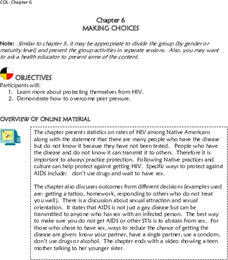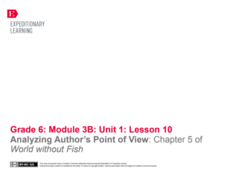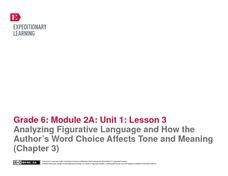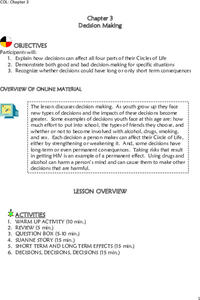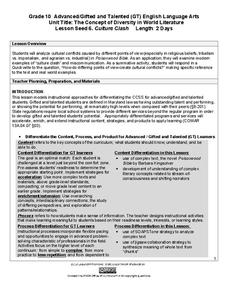Healthy Native Youth
Chapter 6: Making Choices
A lesson looks closely at risky behavior such as teen pregnancy and sexually transmitted diseases. Middle schoolers use a question box to ask questions anonymously. They role-play what life would be like if they became pregnant then...
EngageNY
Grade 9 ELA Module 3, Unit 1, Lesson 6
Are cattle prods beneficial for herding cattle, or do they cause more harm than good? Investigate Temple Grandin's claim about animal behavior with a lesson that focuses on pages 20-23 of the first chapter of her book, Animals in...
EngageNY
Analyzing Author’s Point of View: Chapter 5 of World without Fish
That's an interesting perspective. Scholars read chapter five of World without Fish and use an Author’s Point of View graphic organizer to determine the author's perspective. In triads, they highlight words that support the author's...
EngageNY
Analyzing Figurative Language and How the Author’s Word Choice Affects Tone and Meaning (Chapter 3)
How figurative language affects the tone and meaning in Chapter Three of Christopher Paul Curtis' Bud, Not Buddy is the focus of a series of exercises that ask readers to locate, record, and analyze Curtis' word choices.
EngageNY
Contrasting Two Settings (Chapter 6: "Lost Melones/Cantalouples")
Continue working through Esperanza Rising, by Pam Munoz Ryan, by looking into language choices and discussing text-dependent questions. Pupils converse in small groups and as a class about plot, setting, and figurative language. Using...
EngageNY
Meeting the Main Character: Launching The Lightning Thief (Chapter 1)
Three is company! Scholars work in groups of three to discuss quotes from the first pages of The Lightning Thief. Each group records their thinking on the paper of the quotes before talking about Percy's character using the Making...
Healthy Native Youth
Chapter 3: Decision Making
By way of group discussion, reading, and role-play a series of six activities encourage scholars to make responsible decisions. Following an online introduction, pupils review the concept of volition and answer questions. Middle...
Turabian Teacher Collaborative
How to Find a Research Question
There are so many fascinating topics and concepts to learn about in the world. But where do you start? Begin formulating questions for an argumentative research paper with a guided practice instructional activity. After coming up with...
EngageNY
Text-Dependent Questions and Making a Claim: Digging Deeper into Paragraphs 20–23 of Steve Jobs’ Commencement Address (and connecting to Chapter 11)
In preparation for the unit exam, groups employ the strategies they have been practicing to formulate an interpretative claim about the connections between Christopher Paul Curtis's " Bud, Not Buddy, and Steve Jobs' 2005 Stanford...
Healthy Native Youth
Chapter 5: Learning About HIV/AIDS/STI's and Hepatitis Transmission
Middle schoolers delve deep into facts about HIV, AIDS, Hepatitis, and other STI's by way of discussion and a hands-on activity. Scholars ask and discuss questions anonymously using a Question Box. Two experiments showcase the...
Healthy Native Youth
Chapter 4: Learning About Disease
Communicable diseases are the focus of a instructional activity that primarily uses discussion, a hands-on activity, and a worksheet to drive their point home. Lotion and glitter create a strong visual for communicable diseases. A...
PB Works
George Washington’s Socks: Short-Answer Questions Chapters 1-9
Build a literature unit around the book George Washington's Socks with this series of short answer questions. Broken up in two- and three-chapter increments, these reading comprehension questions allow young readers to demonstrate their...
EngageNY
Annotating the Text and Identifying Argument, Claims, and Evidence: “Double Whammy” Excerpt from “The Exterminator"
That's a double whammy! Scholars read the excerpt Double Whammy from The Exterminator. After identifying the gist of the text, they annotate by marking the author's claim. The group discusses what is meant by double whammy and complete...
EngageNY
Launching Readers Theater Groups: Identifying Passages from Esperanza Rising for Readers Theater that Connect to the UDHR
Teach young readers how to compare two texts and select passages that exemplify a specific theme with Lesson 6 from Unit 3. Begin by modeling how an expert reader selects examples from a text, performing a think aloud on how Article 2 of...
EngageNY
Using Multiple Resources of Information: Creating a Cascading Consequences Chart about DDT and Practicing a Fishbowl Discussion
For every action there is a consequence. Scholars continue their work on creating a cascading consequence chart about DDT using Welcome Back, The Exterminator, Rachel Carson: Sounding the Alarm on Pollution along with graphic organizers...
Maryland Department of Education
The Concept of Diversity in World Literature Lesson 6: Culture Clash
To prepare for a Quickwrite on the question, "How do different points of view create cultural conflicts?" class groups draw examples of religious, cultural, and political conflicts from Things Fall Apart and The Poisonwood Bible to use...
EngageNY
Interpreting, Integrating, and Sharing Information: Using Charts and Graphs about DDT
Is American growing fatter? Scholars begin with a mini lesson on reading charts and graphs using information about Human Body Fat in United States. They then transfer what they learned to charts and graphs using harmful and beneficial...
EngageNY
Gathering Evidence and Drafting a Two-Voice Poem (Chapter 13: "Los Duraznos/Peaches")
Begin class with a short comprehension quiz and review and then move into a new genre: two-voice poems. The activity provides information about this type of poetry as well as a video example made by eighth graders that you can show your...
ProCon
Student Loan Debt
Should college loan debt be easier to discharge in bankruptcy? Scholars sort through the top three pros and cons to decide for themselves in preparation for a class debate or discussion. Learners may also participate in an online poll to...
US Department of State
Reader's Theater: The Adventures of Tom Sawyer
The opening chapters of Mark Twain's masterpiece, The Adventures of Tom Sawyer, can be daunting for some readers. A reader's theater assignment divides the second chapter of the novel into a seven-role script, allowing readers to work...
Roald Dahl
Matilda - The Platinum-Blond Man
Before reading Chapter Six, "The Platinum-Blond Man" in Matilda, readers preview the illustration of Mrs. Wormwood dropping her plate of food, and think about what may have happened to cause the scene. After reading the chapter, class...
Preswick House
Teaching Unit: Invisible Man
Invisible Man is a core text in high school literature classes and one of the most cited works on the AP Literature and Composition exam. Instructors new to using Ralph Ellison's novel and those who have long included it as part of their...
Reed Novel Studies
Third Grade Angels: Novel Study
A million things to do, a ton of homework ... hyperbole sure does help get the point across! With the novel study for Jerry Spinelli's Third Grade Angels, scholars practice writing their own exaggerated sentences. Additionally, they...
Tell City Schools
The Cay
Support your instruction of The Cay by Theodore Taylor with this extensive unit of materials. Provided here are prereading activities, worksheets and discussion questions for the entire book, and reading quizzes that you can use to check...


